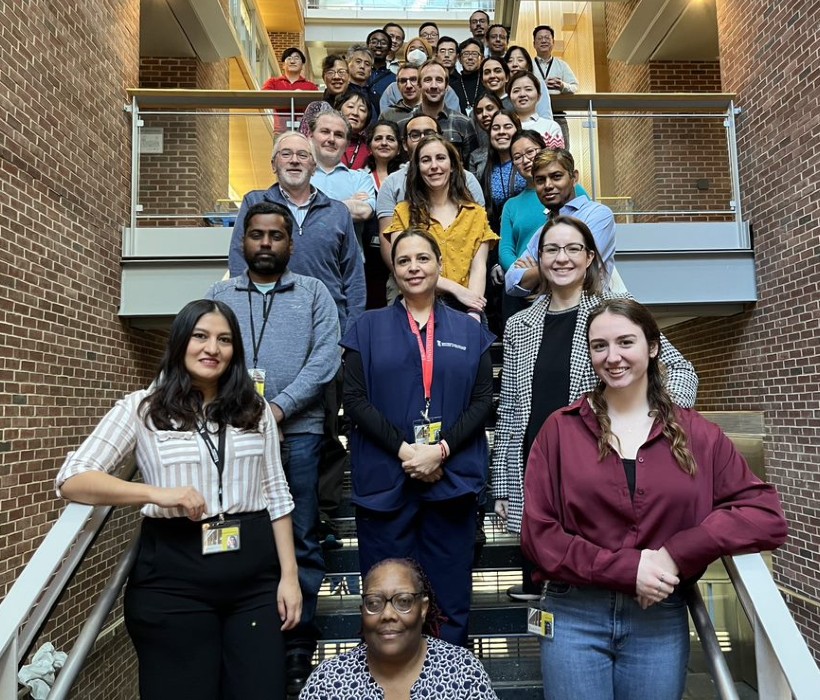contact
Yulvonnda Brown
Office Manager
F 410-706-0865
Welcome to the Department of Neural and Pain Sciences

The Department of Neural and Pain Sciences (NPS) is a Department of the University of Maryland School of Dentistry with research, teaching, and service responsibilities. Its research and educational domains are in the area of neuroscience, with a strong emphasis on the neurobiology of pain. NPS faculty members conduct multidisciplinary sensory-motor system research with a major focus on acute and chronic pain mechanisms. Leaders in this department use state-of-the-art methods including advanced molecular, neurophysiological, neuroanatomical, and neuroimaging techniques. As part of the school of dentistry, this department has a special interest in pain and dysfunction that manifests itself in the orofacial complex. However, we also recognize that study of somatic and visceral pain models throughout the body will provide scientific advances that can benefit our understanding of orofacial pain conditions.
A majority of the faculty conduct preclinical research. At the same time, the department also recognizes the need to transfer its groundbreaking basic science research into the clinical setting, in order to better manage clinical conditions, especially chronic pain, and improve quality of life. As such, collaborative research with clinicians in the school of dentistry, school of medicine, and elsewhere is an important part of our departmental mission. The science conducted by this department is integrated into the graduate and post-graduate programs of the school of dentistry and the Graduate Program in Life Sciences (GPILS) through faculty driven curricular innovations and dedicated teaching efforts.
News and Announcements
Simon Akerman, Ph.D/Marcela Romero Reyes, DDS, Ph.D – have received funding for the following DoD grant, W81XWH-21-1-0485-PR200852 (Akerman, PI, Romero-Reyes, co-PI) – Sphingosine-1-Phosphate Receptor Subtype 1: A Novel Target in the Treatment of Chronic Migraine - $1,663,827.00 (total direct and indirect).
Migraine affects over 15% of the US population, over a billion adults globally, and there is a constant struggle to treat patients with safe and efficacious therapies. For many patients these are ineffective, they can be contraindicated, or they are simply poorly tolerated. There is therefore an urgent need to dissect novel ‘non-opioid’ targets that are both safe and efficacious. The major goal of this project is to evaluate the efficacy of sphingosine-1-phosphate receptor 1 antagonists in preclinical models of migraine headache, migraine aura and medication overuse headache as a novel target. Using pharmacological and genetic approaches we will also dissect their underlying molecular and neuropharmacological therapeutic mode of action, via several unique nitroxidative and neuroinflammatory mechanisms.
Dr. Man-Kyo Chung received NIDCR Award for Sustaining Outstanding Achievement in Research (SOAR) (R35) entitled “Trigeminal Nociceptors: Neural Intersection of Chronic Pain and Alveolar Bone Remodeling”. In this project, dual roles of trigeminal sensory afferents on two fundamental areas in oral health. This award supports total $8M for 8 years.
Dr. Ohannes Melemedjian received the following grants: Validating ASCT2 for the Treatment of Chronic Postsurgical Pain: Pain associated with surgery is experienced by millions of patients every year. Post-surgical pain usually resolves as the surgical site heals. However, up to half of the patients develop chronic pain after surgery. Crucially, little is known about the mechanisms that aid in the resolution of postoperative pain. Moreover, opioids remain the mainstay treatment for post-surgical pain which are fraught with serious side-effects and crucially - abuse liabilities. This grant proposes to validate ASCT2 as an endogenous mechanism that aids in the resolution of postoperative pain. Moreover, an innovative RNA-based strategy that enhances the translation of ASCT2 and alleviates postoperative pain will be validated. Uncovering endogenous targets that resolve postoperative pain can have a broad impact in advancing our knowledge of the transition of acute pain to chronic and lead to urgently needed public health advancements.
Identification of novel targets for the treatment of chemotherapy-induced painful neuropathy: Chemotherapy-induced painful peripheral neuropathy (CIPN) is the most common toxicity associated with widely used chemotherapeutics. CIPN is the major cause of dose reduction or discontinuation of otherwise life-saving treatment. Unfortunately, CIPN can persist in cancer-survivors which adversely affects their quality of life. Moreover, available treatments are vastly inadequate which necessitates the development of novel mechanism-based therapies that can either prevent or treat CIPN. This grant will validate novel mechanism-based molecular targets that not only prevent or treat CIPN but might also potentiate the anticancer effects of chemotherapeutics.
Ke Ren, Ph.D./Feng Wei, Ph.D. - R01 DE029946 (Ren/Wei, MPI) NIH/NIDCR 07/01/2020-6/30/2025 Amount: $3,030,104 (Total direct and indirect) Amount: $3,030,104 (Total direct and indirect) "Disruption of Homeostatic Neuroimmune Interactions in Descending Circuitry in the Development of Pain Chronicity” Project summary: Millions of people suffer from chronic or persistent pain, which is a major medical problem. The current treatment for chronic pain conditions is unsatisfactory. In recent years, ample evidence has documented the role of glia and their interactions with neurons in the development of persistent pain. Despite overwhelming evidence from preclinical studies, clinical trials for the treatment of chronic pain with glial modulators have not been successful, which is related to our incomplete understanding of the mechanisms. While a majority of studies show the pain-facilitating aspect of the injury-related glial activity, a potential inhibitory/protective role of neuron-glial interactions in the development of persistent pain has been largely overlooked. This project will analyze inhibitory/beneficial neuroglial interactions in the descending pain modulatory circuitry and test the hypothesis that disrupted inhibitory glial activity contributes to the emergence of chronic pain. Exploring the beneficial effect of glial activity will fill the gap in our understanding and lead to a transformative shift in the search for improved management for chronic pain.
Jin Ro, Ph.D – received a five year, $2.55 million grant from the National Institute of Aging (NIH-NIA) to investigate ‘Age-related decline in endogenous pain modulation and its impact on osteoarthritis pain.’ In this project, Dr Ro and the co-investigators, Drs. Joyce Da Silva (SOD), Shuo Chen (SOM), and David Seminowicz (Western University, Canada) will explore brain circuits that underlie age-related changes in descending pain modulatory function and the mechanistic links between dysfunctional pain modulatory systems and chronic osteoarthritis (OA) pain in the aged population. Specifically, they will examine whether enhancing the strength of specific brain circuitries mediating endogenous pain modulation, either experimentally or through exercise, can improve OA pain outcomes in aged populations. Findings of this project will stimulate progress toward the development of novel evidence-based pain treatment strategies for older adults.
Richard Traub, Ph.D./Ohannes Melemedjian, Ph.D. - 1R01DE029074-01 (Traub, Melemedjian, MPI; Seminowicz, Da Silva, Scott, Ernst, co-Investigators) NIH/NIDCR "Novel Target Identification for Treatment of Chronic Overlapping Pain Using Multimodal Brain Imaging” The major goal of this grant is to use multiple imaging technologies (fMRI, MSI) identify novel therapeutic targets in an animal model of chronic overlapping pain conditions.




